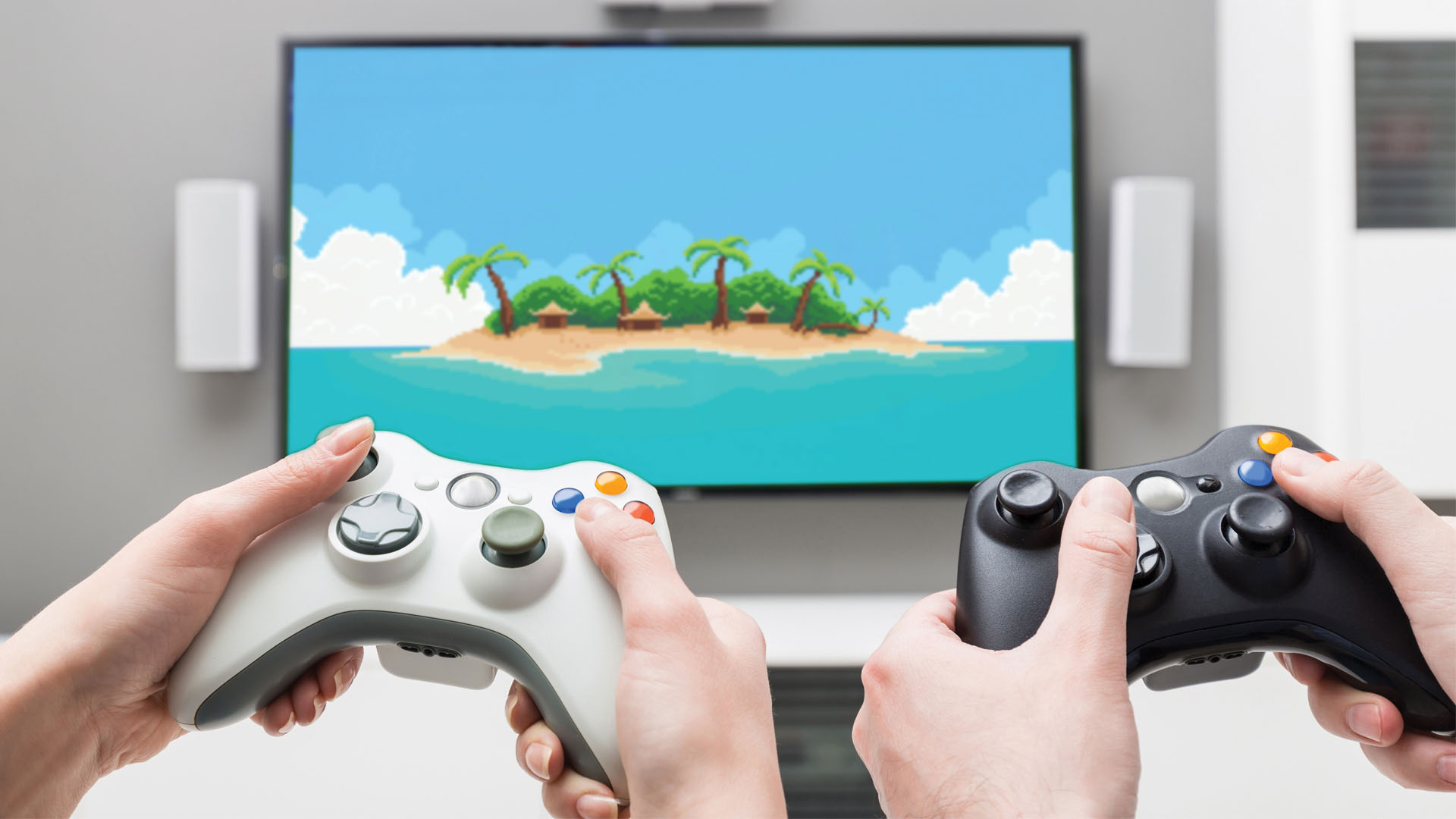Video Games in the Time of the Pandemic: How We Learned to Switch On Socialization
Would you like to safely escape to a perfect island getaway, amidst a global pandemic? It is possible – if you’re willing to switch up your travel plans for a blissful digital experience. And, with the stigmas of wasted time and limited socialization surrounding video games increasingly becoming relics of the past, it may just be time to book those pixelated flights.
While being brought up in a household that regularly gamed as a family activity (with both traditional board games and sitting around the television with controllers in hands), parents of friends were quick to dismiss my suggestions to play video games when visiting their homes – but those same parents had no issues in gathering us around for Monopoly, Trouble, Uno, or any other tabletop game.
I could never quite grasp that view; although you may be spending more time looking at a screen than each other when playing video games, there is still just as much communication, excitement, and wonderment with each button press as there is with movements of physical game pieces.
Lessons via a controller
For me, video games have always provided an escape, even amidst the unwarranted ideas of wasting precious productive time and losing out on social opportunities.
As a child of the late ‘80s and early ‘90s, the eight-bit pixelated art and chiptune music was always just a power button away – and they granted me reprieve from any pestering homework anxiety long after I had been called inside post-sunset.
I first started delving through dungeons in The Legend of Zelda, released on the Nintendo Entertainment System (NES) in 1986. Just to be clear: I wasn’t actually the one doing much of the dungeoning and puzzling-solving back in those days; my dad was my link to the experience, as he was the designated Player 1.
Friday evenings were set aside specifically for the purpose of journeying back to the television glow provided by our NES, with my dad deftly navigating the simple and flat colors of Hyrule on the constantly scrolling screens. Although I wasn’t directly in control of the game, I was often tasked with input: Should we go down into this dungeon we’d just found, or should we double back and pick up that item we couldn’t afford just a few screens back?
Those evenings gave me something I didn’t tend to get with my dad – time for just us when we could communicate and work together. Even though I wasn’t the one holding the controller, I really did have control over how those sessions played out – I was given agency with choices that had an impact on a narrative.
Little did I know at the time, he was purposefully pulling a Mr. Miyagi – paying attention to all those screens and making mental maps, while also keeping track of the game’s currency, had me learning fundamental navigation and math skills that still serve me to this day. Also, because I was actively using those skills and that knowledge within an activity I genuinely enjoyed, my intrinsic motivation was at its peak – I was focused on improving my navigation skills across the various screens and obtaining better equipment for my own personal achievement, rather than being motivated by an outside source.
As the newer generations of gamers would say these days, I “got good.” More importantly, I was learning for the sake of learning, which undoubtedly instilled in me the passion I have for being a lifelong student – and now a teacher.
Community and social skills – 8-bits at a time
As the years passed, I sought more opportunities to play games by myself – heavily focusing on experiences that provided lengthy narratives. Becoming an avid reader through scrolling text provided by gaming cartridges influenced my desire to engage with what I deemed “interactive novels” as a kid — mostly to try and help explain to my parents why so many hours in a video game could net a positive return.
But looking back to my late elementary school years all the way through graduating high school, video games at the same time consistently provided me with a plethora of social opportunities that I may not have had otherwise. As much I enjoyed sinking hours upon hours into a single game, nothing else could ever really compare to the wonderment of lugging a video game console to a friend’s house for the multiplayer experiences of childhood sleepovers. The friends who I met through our mutual love of gaming remain some of my closest to this day, and we can still recall exact moments in our histories together – whether cherished, last-second victories in racing simulators or hard-fought battles together that just didn’t quite go the way we planned.
To that end, the times we were defeated resonated with us most – because no matter how many times we lost, we kept picking the controller back up, and we moved forward … together.
Contrary perhaps to popular conception, comradery, and clear communication are as important in gaming ventures as it is in social and professional circles. – In all those situations, if you’re not learning how to positively receive and react to feedback, while also having an opportunity to having your needs heard, you’ll eventually be facing a “game over.”
Gaming – a pandemic social rescue mission!
Unfortunately, no matter how prepared we may have felt we were, many of our typical social activities were handed a very crushing “game over” in March of 2020, as a result of COVID-19. For me, a harsh reality of the world coming to a halt was trying to find a safe and responsible way to make my wife’s April birthday as special as possible, to at least temporarily distract from a situation over which we had no control.
Thankfully, the timing of the pandemic lockdown coincided with the release of the wonderfully aimless Animal Crossing: New Horizons on the Nintendo Switch – a console that my wife and I both already owned.
At its core, Animal Crossing is best described as a slice-of-life simulator; your character player (or avatar) settles into an open space and is granted property to help build a community. As time passes, you collect resources, establish homes for fellow villagers, and develop plots of land – from establishing a museum full of local flora and fauna to hosting friends for island visits and improvised games of hide-and-seek and tag.
With digital offerings of physical media being more readily available than ever, neither my wife nor I had to leave the house or bring in a package to start our island adventures – we had New Horizons downloaded the night of release, and by the next morning, we were busy naming our pieces of land and planting as many fruit trees as possible to get ahead of our crushing in-game debt.
And then it dawned on us.
Being able to host friends on your customized island may not have been the solution to the IRL (in real life) problems that we were looking for, but it was exactly what we needed. Within the first week of April, nearly all of our friends had invested as much time in their little island getaways as we had – AND we had a way to connect in the palms of our hands.
On the evening of my wife’s birthday, our friends connected to our copy of Animal Crossing – and with the combination of Zoom for seeing and speaking with one another, we hosted a wonderful evening of island-hopping and item-swapping, many of which were actually presented as little wrapped gifts on my wife’s Switch screen.
It didn’t take long for this to become a weekly gathering, replacing our traditional board game nights with video calls and crossing pixelated oceans – and giving us the hope we needed that one day, not too far away, we could gather in the same room as we journeyed from island to island.
We were all spending time together, without being together – we were maintaining our social lives through the very screens I was once discouraged away from in favor of needing to exist in the same physical space for social interactions to have any true meaning.
The idea that video games amount to not much more than tossing one’s minutes and hours into the trash has slowly evolved into more acceptance as a cultural norm – as more and more people are realizing that the social connection through gaming is now in the palm of their hands, especially in a time when we are all more connected than ever with multiple electronic devices.
Whether separated by distance or now by a global pandemic, video games provide multitudes of untapped opportunities for adopting new skills and connecting with friends and family in safe and controlled environments – and in doing so, they can remind us that no matter how far apart we may be, the support we may need is often just a power button away.






